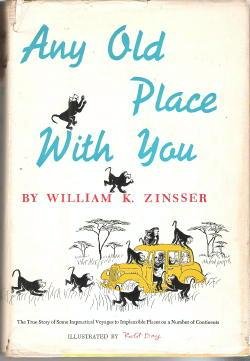 As readers of “Browsings” will discover in the weeks to come, I’m pretty much what used to be called a “bookman.” This means, essentially, that I read a lot and enjoy writing about the books and authors that interest me. Sometimes the result is a review, sometimes an essay. But my tone aims to remain easygoing and conversational, just me sharing some of my discoveries and enthusiasms.
As readers of “Browsings” will discover in the weeks to come, I’m pretty much what used to be called a “bookman.” This means, essentially, that I read a lot and enjoy writing about the books and authors that interest me. Sometimes the result is a review, sometimes an essay. But my tone aims to remain easygoing and conversational, just me sharing some of my discoveries and enthusiasms.
Like any sensible person, I’m cowed at the prospect of succeeding William K. Zinsser in this online column for The American Scholar. Even as I type these sentences, I’m wondering if there’s a way to add a little more dash and color to what I’ve written. Dickens used to tell his contributors to Household Words: “Brighter! Make it brighter!” I can imagine Zinsser saying this to his writing students at Yale, back in the days he taught there.
I read On Writing Well when it first came out, and I’ve periodically gone back to it since. Having been notably lackluster in my grammatical studies in high school and never having taken any writing courses in college, I have since welcomed all the linguistic counsel and stylistic advice I can get. On Writing Well thus stands on a shelf, if only a mental shelf, with such classics as Fowler’s Modern English Usage, Herbert Read’s English Prose Style, Robert Graves and Alan Hodge’s The Reader Over Your Shoulder, Theodore M. Bernstein’s The Careful Writer, and of course, Strunk and White’s The Elements of Style.
But On Writing Well is more than a guide or even an exemplar of the principles it so attractively preaches. It’s also a wonderful anthology of quotations, almost a commonplace book. For instance, the passages Zinsser cites from Alan Moorehead sent me scurrying to locate copies of The White Nile and The Blue Nile, and then everything else by this superb journalist-historian, now rather forgotten. Happily, any good used bookshop is likely to stock copies of these expertly paced accounts of 19th-century African exploration. Look for the oversized, illustrated editions, which come with maps, period pictures, and much else.
On Writing Well also led me to Zinsser’s own books. Only last year I acquired a copy, in a fine dust jacket, of his first: Any Old Place With You. Published in 1957 and winsomely illustrated by Robert Day throughout, it’s subtitled “The True Story of Some Impractical Voyages to Implausible Places on a Number of Continents.” On the back cover a skinny and very youthful-looking Zinsser sports a white T-shirt and khakis; his biographical note identifies him as “a man scarcely out of his twenties” and currently a film critic for the New York Herald Tribune.
The style of Any Old Place With You—the title comes from a song by Lorenz Hart—is breezy and almost relentlessly witty, in the manner I associate with dim childhood memories of Holiday magazine. Here’s how it opens:
One August evening a few years ago, on a park bench in Manhattan, I turned to a willowy blonde named Caroline Fraser, who happened to be turned to me, and spoke the words that started it all: “Let’s get married and take a trip to Africa.”
Her blue eyes widened, and I searched them for an answer. But I could see only two words: “Drink Budweiser.” They were reflected from a blinking neon sign.
It wasn’t exactly what I had in mind, but it was something, and I pressed my case. I had been suggesting marriage for weeks, but my proposal lacked that extra detail, like a trip to Africa, that every girl sets her heart on.
“Did you say Africa?” Caroline asked.
“Yes, Africa,” I purred, seizing the advantage. “King Solomon’s Mines, the Mountains of the Moon, fabulous Zanzibar—it’s got everything. Think of Stanley looking for Livingstone, Baker looking for the lost source of the Nile, Clark Gable looking for Ava Gardner.”
Before you know it, Caroline has said yes and the new couple is embarked on the Atlantic voyage of the accursed ship Bahama. But I should say no more. Find your own copy of the book.
Oh, yes, one more thing, as Lt. Columbo used to say: when I decided to write this opening piece for “Browsings,” I asked my esteemed friend and editor Robert Wilson if William Zinsser was still married. “Yes,” said Bob. “Her name is Caroline.”

